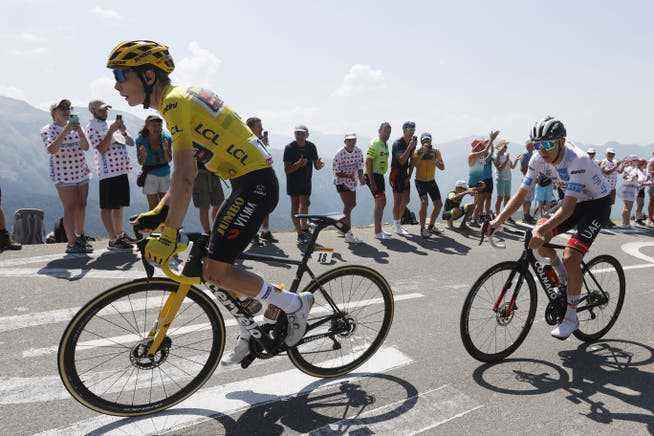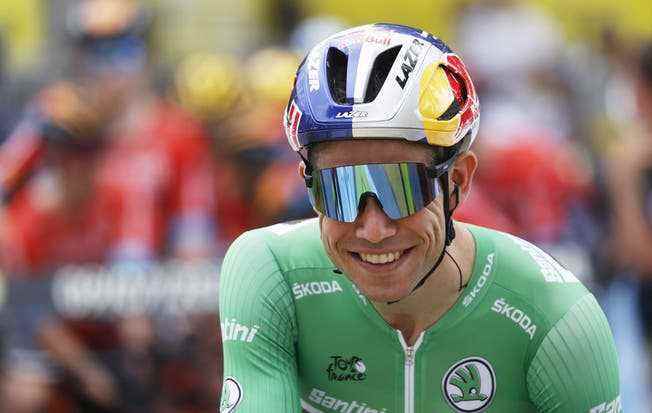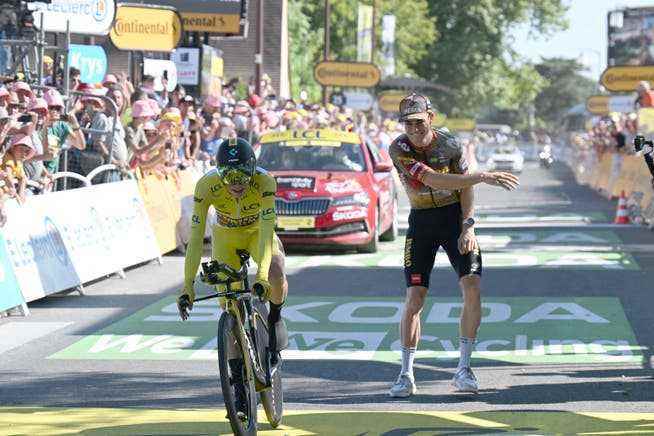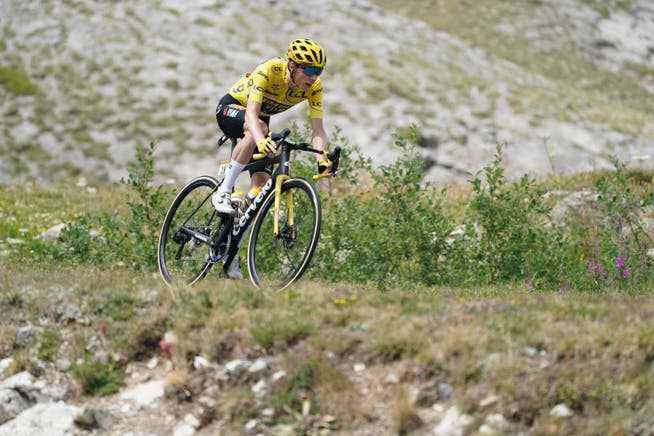The Dane has achieved a meteoric rise. He owes his triumph in the world’s largest cycle race not least to the impressive collective performance of his team.
In 2018 he was still working several hours a day in a fish factory – now he is the Tour de France winner: the Dane Jonas Vingegaard.
After the final time trial of the Tour de France, Alexander Wlassow, fifth overall, was 16:37 minutes behind the winner Jonas Vingegaard. Adam Yates, tenth, was even 25:43 minutes behind. They never stood a chance.
The gaps from first to fifth and tenth at the Tour of France were last greater in 1997, when Jan Ullrich triumphed. 25 years later, Vingegaard had only one real rival, runner-up Tadej Pogacar. When the Dane and the Slovenian attacked each other in the mountains, the other drivers immediately threw in the towel several times. They simply let the two high-flyers pull away.

The formative duel of this Tour de France: Jonas Vingegaard (left) and Tadej Pogacar drive away from everyone else.
Geraint Thomas, third overall, improved again in all areas after his Tour de France victory in 2018. At least that’s what Rod Ellingworth, the deputy boss of his team Ineos, says. But Thomas drove a lonely race. He was clearly better than everyone else but worlds away from Vingegaard and Pogacar.
And the most amazing thing: the Dane and the Slovenian weren’t even the undisputed stars of the race. The professional world was at least as amazed by the performance of Vingegaard’s teammate at Jumbo-Visma, Wout van Aert. The Belgian won stages after solo attacks, in the sprint and in the time trial.
For many viewers there was one constant over the past three weeks: whenever they turned on the television, the green jersey, which is actually reserved for the best sprinter, was in an escape group. Van Aert never seemed to tire on this tour, which was completed at one of the highest average speeds in the history of the race.
Cooperation with industry luminaries
There are plausible reasons for the strength of Jumbo-Visma. The Dutch team recognized several years ago that in the pursuit of perfection it is not enough to rely on the expertise of former professional cyclists. Instead, the team works with renowned experts in a number of areas, for example with Asker Jeukendrup, who has also helped FC Barcelona, on nutritional issues.
Thanks to the reliable support of the supermarket chain Jumbo, there is also no lack of budget for a star ensemble. The last piece of the puzzle that was missing before the ultimate triumph might have been a bitter defeat.

Never seemed to tire over the past three weeks of the Tour and laid the foundation for Jonas Vingegaard’s overall victory: Wout van Aert, the green jersey winner for best sprinter.
At the 2020 Tour de France, then-Jumbo Visma captain Primoz Roglic lost to Pogacar at the last moment after wearing the yellow jersey for ten days. The self-confidence was too great, one had failed to distance the opponent more clearly in time. The result shocked not only Roglic. The horrified expression on Van Aert’s face at the scene was also engraved in the memory of many fans.
As a result, Jumbo-Visma not only succeeded in replacing the deceptive feeling of superiority with humility and in working even more intensively on details – at least that’s how it was presented. In addition, the event welded the team even closer together. On Saturday night, when he successfully completed the final time trial, finishing second behind Van Aert, Vingegaard said: “We all thought about what happened two years ago. It was in the mind.” And: «We are really friends. Almost like brothers.”
The result was one of the most impressive team performances in recent years. Everyone gave everything. For example Roglic, who dislocated his shoulder on the fifth stage, but didn’t think about giving up immediately. The Slovenian grabbed a spectator’s chair, balled his ankle in while sitting and drove on.

“We really are friends. Almost like brothers.” – Wout van Aert (right) wins the individual time trial on Saturday as Jonas Vingegaard crosses the finish line to congratulate his teammate on the overall win.
Roglic also injured his back in the fall, according to unconfirmed reports he broke two vertebrae. Nevertheless, the man who originally wanted to win the race himself provided elementary help for Vingegaard in the following days. At the Col du Galibier he attacked Pogacar several times. This wore him down, as he later admitted. Mainly because of this, Vingegaard was able to distance him on the next mountain, the Col du Granon.
Van Aert laid the foundation. Vingegaard also fell on that fifth stage with the dreaded pavé sectors and he was already seeing all dreams fading away. The otherwise confident Dane became hectic, changing bikes four or five times in a short space of time. But his Belgian team-mate gave him a slipstream and limited the damage. “Without Wout, Jonas would have lost more than a minute that day,” says Jumbo Visma sports director Merijn Zeeman.
The team had been criticized before the Tour of France for the strategy of fighting for the yellow and green jersey at the same time. Now Jumbo-Visma has not only won these two ratings, which was last achieved by Team Telekom in 1997. In addition, Vingegaard also secured the mountain jersey. If he had been born just 22 days later than December 10, 1996, the Dane would even be at the top of the rankings for the best young professionals.
Jonas Vingegaard explains his leap in performance in the time trial with improved aerodynamics, which he worked on in the wind tunnel and on the track.
Van Aert’s constant presence in escape groups was not a pointless waste of strength, it was intimidating, even on Pogacar. In the first stage of the Pyrenees, the Slovenian remained surprisingly defensive, and in the evening he said: “They still had Van Aert in front, so an attack would not have made sense for me.”
Pogacar’s defeat is a turning point for cycling. After his victories in 2020 and 2021, many considered him almost unbeatable for years to come. Plausible reports have recently been circulating that in 2023 he will try the Giro Tour Double in 2023. A double success on the two tours would hardly have been considered a sensation. But now Pogacar has to go over the books himself.
“Not an ideal job for us cyclists”
The rise of Vingegaard is striking. In 2018 he was still working several hours a day in a fish factory. “Not an ideal job for us cyclists, you stood around in a cold room for hours,” said his later professional colleague Michael Valgren once. Vingegaard admits that he was not the most diligent in training at that time.
But Jumbo-Visma saw Vingegaard’s potential and hired him despite falling far behind in 2018’s most important junior race, the Tour de l’Avenir. He hadn’t been the captain on his crew. Pogacar won, Switzerland’s Gino Mäder was third, Vingegaard was 67th.
In 2019, the breakthrough seemed a long way off. Few would have predicted Vingegaard’s victory in the Tour de France when he finished 22nd in the Danish National Time Trial Championships. The late bloomer explains its jump in performance in the fight against the clock primarily with improved aerodynamics, which have been worked on in the wind tunnel and on the track.

Was clearly the best climber on the Tour of France: Jonas Vingegaard.
On Saturday evening, the second in the previous year answered the obligatory question about doping, which every successful cyclist is asked sooner or later: “We are absolutely clean. All of us. Nobody takes anything illegal.” On the one hand, the reaction sounded natural, almost banal. And yet it at least worked better than Pogacar’s brief note last year that he had never tested positive. Because that proves relatively little at a time when no top professional has been convicted using a blood or urine sample for years.
Jumbo-Visma has so far been considered exemplary in terms of transparency, which has strengthened trust. The team would be well advised not to change anything. Stepping into gray areas is also harmful in public relations. On Saturday, several supposedly independent cycling podcasters belatedly disclosed that they had been working for Jumbo-Visma since February. One of them recently questioned the performance of a Pogacar helper. For a team that claims to do everything right, the incident comes across as surprisingly unprofessional.
